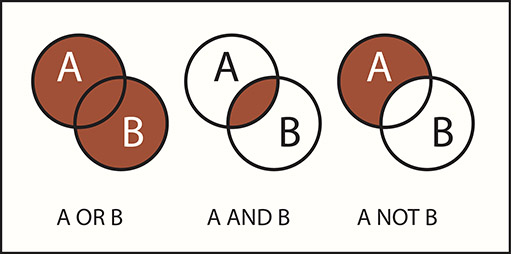Show Navigation Menu
Section Two : Becoming a Researcher/Scholar
Chapter 4: Effective Research
Hide Navigation Menu
Home Page
Section 2 Becoming a Researcher/Scholar / Chapter 4 Effective Research
6. How to Search
There are a few ways to conduct research effectively depending on the learner's available resources and field of study. Today, Internet users type a question into a search engine and an “answer” appears instantaneously on the computer screen. Unfortunately, some of these learners assume finding the answer is the goal and the completion of the research process. However, this is simply the beginning of long process that will require mental dexterity and endurance to follow a search to its appropriate destination or ending point. Most learners conducting a quality search will realize rather quickly that there is no finish line, but, rather, a series of paths that will lead to more questions and ideas. Eventually, researchers will have to stop, postpone, or at least slow down the search in order to write/share their findings with others.
Learners can begin an inquiry using the Internet, but it should quickly move to the learners’ library, where their access to databases will dramatically improve the quality of their search. Unless learners already know the author’s name or title, the majority of searches will use either keywords or subject headings to locate materials on the subject.
Keyword Search
Keyword searches are the most popular and easiest method to implement, but it does require some practice using Boolean operators. Boolean operators connect key concepts together using three simple words: AND, OR, and NOT. Each word has the capacity to associate, broaden, and/or limit a search depending on its application. For example, a learner conducting a search about women in leadership positions in Christian nonprofit organizations. The learner may use AND, OR, NOT, or a combination of these operators to connect these ideas in their search.
Using AND
Women AND Christian AND Leadership
Phrases:
Women leadership AND Christian leaders AND nonprofit organization
A researcher can combine concepts by thinking of related words or synonyms and connecting them with the operator OR.
Using OR
Leadership OR guidance OR supervision
Phrases:
Christian leadership OR spiritual guidance OR religious supervision
Using NOT
Christian leadership OR nonprofit leadership NOT men
Using AND and OR
Christian leadership AND women OR female
Using OR and NOT
Women leaders OR female leadership NOT men
Truncation
The truncation symbol (*) is another tool available when doing a keyword search, which allows learners to broaden a search without having to insert every variation of the word.
Using Truncation (*)
Wom*n AND Christ* AND Leader*
The search will provide results for:
Wom*n= Woman, Women
Christ*= Christ, Christian, Christianity
Leader*= Leader, Leaders, Leadership
The combination of Boolean operators and the truncation symbol can open the search possibilities to a number of locations that learners can use to deepen their understanding of the topic, but also understand the subject’s borders.
The research process should generate several positive research outcomes:
1. Educate the researcher on the topic.
2. Provide learners with useful data that can contribute or support their research.
3. Reveal the seminal works written on the topic.
4. Identify the significant researchers contributing to the topic’s metanarrative.
5. Lead learners to think metacognitively about the topic.
6. Inspire learners to write about their topic.
7. Give learners ideas for future research projects.
The ultimate goal for the learner is to generate a list of potential reading materials that will contribute to a quality research paper and/or publication.
Subject Heading Search
A subject heading search requires learners to use words from a predetermined vocabulary list. These terms come from broad categories that enable the user to locate material based on the subject area. For example, a learner who wants to find peer-reviewed articles on Therapeutic Theatre styles could type the subject terms “theatre AND therapy” into the search bar to produce a list of potential readings. As the learner inserts the word “theatre,” a drop-down menu will appear with additional subject options, such as “theatre of the absurd,” “theatre education,” and “theatre of the oppressed.” The same happens when the researcher types the word “therapy.” Some of the additional subject headings offered are “therapy techniques,” “therapy outcomes,” and “therapy for depression.” A learner with knowledge of the field will use “theatre of the oppressed” and “therapy techniques” to conduct his or her subject heading search. This approach offers less flexibility within the search itself, but a strategic implementation of subject headings can produce an effective list of useable materials focused on a particular subject, instead of crossing over into multiple fields of study.
Publication Date Search
A publication date search enables a researcher to locate materials from a specific period of time. A popular practice is to search for current articles that have published within the past five years on a particular subject and not waste time going through dated materials. However, some learners may want to examine a particular time period and compare their findings with recent research publications. The publication date search is a way to narrow options and help a researcher save time.

Most learners conducting a quality search will realize rather quickly that there is no finish line, but, rather, a series of paths that will lead to more questions and ideas.

TABLE 2.4
Search Options
Other Search Options
Learners can search for specific items instead of searching broad subject headings or keywords. By the time doctoral learners reach the literature review portion of their study, they should have an adequate understanding of their field’s academic landscape. Authors’ names and particular journal publications become part of their vernacular. Learners will go directly to known periodicals or particular document types to find specific items.
Learners can search by document type, such as research articles, book reviews, case studies, conference papers, and more. Also, specific periodicals can be found using ProQuest or EBSCOhost search options as well as source types, such as newspapers, books, dissertations, academic journals, professional magazines, reports, and more. When possible, learners should attempt to find the most recent research on their chosen topic. As mentioned earlier, PsycINFO allows learners to find items by way of methodology and CINAHL headings can be used to search for specific medical terms.
Outside the Library
The most popular path doctoral learners will use to conduct research is their institution’s library. It is important to note that not everything will be found in the library, and doctoral learners are expected to exhaust all possibilities to view or access important data that contribute to their research. Many students must use InterLibrary Loan to get certain materials; whereas other researchers will have to travel to a library’s special collections because the materials are unavailable through InterLibrary Loan and to the general public. Other learners may have to travel abroad to a museum to view original manuscripts that may require an expert to transcribe, interpret, or explain aspects of the artifact. This can become expensive, and it is the doctoral learners’ responsibility to finance their own research, unless grants, scholarships, or stipends can be secured. Learners will have to organize their time and finances effectively to complete a dissertation successfully.
InterLibrary Loan
Like most universities, GCU’s library is unable to house every periodical and book ever written. However, InterLibrary Loan (ILL) is a free service that can help researchers request items that are unavailable or found outside of the GCU Library collection. The GCU Library staff will e-mail a full-text article to learners within 3-12 business days of their request. The same process applies to book requests, but the delivery time can take between one to three weeks. Books are mailed to the learner’s residence or can be picked up at the campus library.